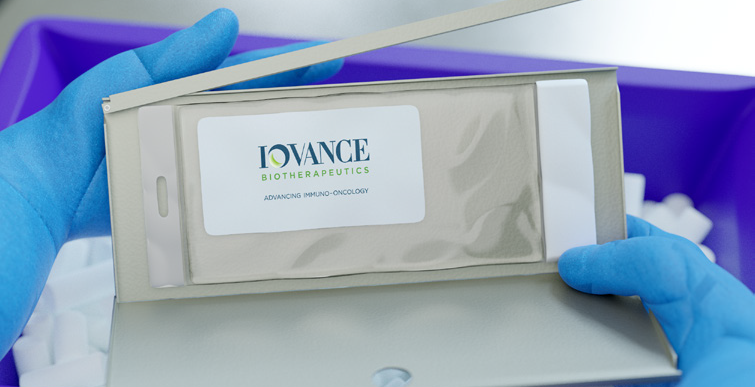OICR President and Scientific Director Dr. Laszlo Radvanyi reflects on the potential impact of a novel drug for metastatic melanoma, and his important role in the drug’s development.
The U.S. Food and Drug Administration (FDA) has granted accelerated approval to a first-of-its-kind therapy that harnesses a patient’s own immune cells to fight skin cancer.
The drug, known as lifileucel (or AmtagviTM), is made by extracting cells called ‘tumour infiltrating lymphocytes’ (TIL) from a patient’s tumour sample and then using them to kill that same tumour.
The FDA approved lifileucel for patients with metastatic melanoma whose cancer could not be stopped by other treatments, making it the first TIL therapy approved for commercial use in North America. It also marks a significant achievement for Iovance Biotherapeutics, the U.S. biotech company behind it.
OICR President and Scientific Director Dr. Laszlo Radvanyi was Iovance’s founding Chief Scientific Officer (CSO) in 2014 and 2015 when it was initially established as Lion Biotechnologies. He and his team, together with then CEO Manish Singh, designed and built the company’s lab-office complex in Florida, recruited its initial scientists and lab technicians, and did the complex pre-clinical development work for Iovance’s first critical lifileucel trials in melanoma.
OICR News asked Radvanyi about the work that went into this groundbreaking therapy and what its FDA approval means for patients with melanoma and other cancers.
Why is this such an exciting development for patients with metastatic melanoma?
In this new era of personalized medicine, TIL therapy is about as personalized as it gets. It is made from a person’s own T cells, which are extracted, ‘expanded’ and infused back into the patient to kill the very tumour they came from.
The data from Iovance’s clinical trials has been tremendously exciting. Many people have had complete response after TIL therapy, meaning their cancer is completely gone. It is truly a life-saving therapy, and it will help make metastatic melanoma a survivable disease.
How significant is this achievement from a scientific perspective?
People have been trying to get a cell therapy to market for about 30 years, and they have generally been considered extremely difficult to commercialize. That’s because it’s a very difficult, involved process to manufacture cell therapies, and it can be time-consuming and costly.
When I helped launch Iovance as founding CSO, many people balked at the idea of advancing cell therapy and getting it approved by the FDA.
Well, we took up that challenge and did a huge amount of work to prove that it was safe and effective for patients and reduce the associated time and costs. My colleagues at Iovance and I showed that with hard work and creativity, we can do something no one thought could be achieved, and something that will make a major impact on the lives of people with cancer.
Does the approval of the first TIL therapy have implications beyond melanoma?
While this FDA approval is for metastatic melanoma, TIL therapy has the potential to be applied to all sorts of other tumour types. There are ongoing clinical trials for lung cancer, breast cancer, ovarian cancer and pancreatic cancer.
In my own lab at OICR, we are working to understand all the different antigens that trigger TILs to attack tumours. We’re exploring whether TILs recognize what are called ‘non-coding antigens’, which are considered great targets for cancer therapies. If so, that could open the potential for all sorts of other personalized TIL drugs.
What’s the status of TIL therapies in Canada?
While TIL therapies have not yet been approved for commercial use by Health Canada, I would love to see Canada approve this life-saving therapy as well as develop TIL manufacturing capacity in the future. Ironically, several Canadian scientists – including myself – were involved first-hand in establishing Iovance in 2014-2016 and laying the groundwork for the company’s success.
Canada also has many visionary leaders in the TIL field. This includes Dr. Pamela Ohashi and Dr. Marcus Butler at Princess Margaret Cancer Centre, who have been treating patients with TIL therapy as part of clinical trials. Dr. Simon Turcotte at the Centre Hospitalier de l’Université de Montréal has been active in establishing TIL manufacturing and clinical trials for melanoma and other cancers, while Drs. Brad Nelson and Robert Holt of BC Cancer have also been developing TIL therapy. Canadian biotech company Turnstone Biologics has also gotten into the TIL space through the acquisition of a California biotech, Myst Therapeutics, in 2021.
All this attests to our talent and capacity to be a significant player in the growing TIL therapy field in Canada. And there’s no reason why Canadians cannot use our own biomanufacturing expertise to advance and commercialize TIL therapies, like we did with an OICR-supported platform to manufacture CAR-T cell therapy in Canada through a consortium called BioCanRx.
As founding CSO of Iovance, I’m proud to have helped set things in motion for FDA approval, and proud of my colleagues there for realizing this landmark achievement. Now, as President and Scientific Director of OICR, I am excited to continue building capacity in Ontario and across Canada to develop novel therapies and get them patients who need them.

